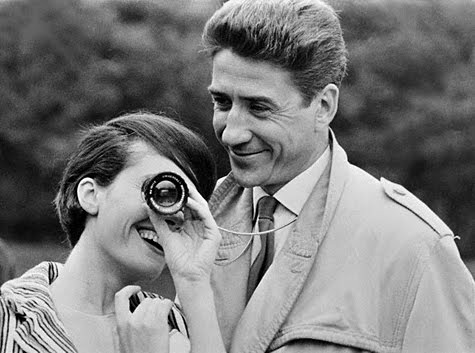
When asked about the future of cinema in 2009 at the New York Film Festival, Alain Resnais responded, “That’s an enormous question, which we should answer over dinner, and this dinner would last a week… I don’t believe what I read every ten years about the death of cinema coming up.” And who could blame him? He was 87 years old at the time, and he would direct two more films—2012’s “You Ain’t Seen Nothing Yet” and “Life Of Riley,” which premiered last month at Berlin Film Festival. Sadly however, while the medium lives on, it has lost one of its greatest voices as Resnais passed away over the weekend at the age of 91.
Where does one begin to encapsulate the career of Resnais? He was a multiple award winner, taking numerous honors from festivals in Berlin (where “Life Of Riley” just won the FIPRESCI and Silver Bear Alfred Bauer Prize), Cannes (Lifetime Achievement in 2009), Golden Globes, BAFTA, Césars (where he also directed ten different actors to nominations) and more. And while the statues are nice, it’s the films themselves that will endure and uphold his legacy.
The filmmaker first garnered attention with “Night And Fog,’ his thirty-minute look at Nazi concentration camps ten years after the end of WWII, that still remains one of the essential reflections on the war. And his first feature, “Hiroshima, Mon Amour,” would also find the director telling a story tinged with memory of war. While that film is considered an important part of the French New Wave canon, the movement as a whole was one Resnair himself didn’t feel he was part of.
Indeed, two years later in 1961, Resnais would unveil his haunted, enigmatic and gorgeous “Last Year At Marienbad,” a film that still defies easy description to this day. The surreal, dreamlike film plays with reality and fantasy, continually subverting any traditional notions of narrative, for what is one of the most unique cinematic experiences in film history.
And while Resnais earned a strong reputation among cineastes, it would be 1980’s “Mon oncle d’Amérique,” starring Gerard Depardieu, where Resanis would connect in a major way with the public. This film followed a run that included 1968’s “Je T’aime, Je T’aime,” whose premiere at the Cannes Film Festival was canceled following the events of May 1968, with the film going somewhat AWOL for a few years (it’s still on on DVD, but Film Forum recently brought it back for a rare one week revival in New York). The director wouldn’t make another feature until 1974’s “Stavinksy” (a flashy film starring Jean-Paul Belmondo, featuring music by Stephen Sondheim). And this was followed a few years later with his first English-language feature “Providence” starring John Gielgud.
Moving into the latter part of his career, Resnais’ approach to films continued to shift, moving away from the formal approach of his earlier movies, to dabblings with genre, to taking a direct influence from the worlds of theater and music, including three adaptations of plays by Alan Ayckbourn.
“They say that a director always makes the same film,” Resnais told the Village Voice in 2009. “I try to make, as François Truffaut said, the next film in opposition to the one that came before. I’m not sure if I succeed. To put it another way, I agree with the auteur theory, but I don’t consider myself an auteur. I’m more of an artisan, a craftsman.” Artisan, craftsman, auteur… No matter what word you use to describe Resnais, he was an original, and he will be deeply missed.
Below, you can spend the day catching up on some essential films in the Resnsais canon in full, including “Mon Oncle d’Amerique,” “Night And Fog,” “Last Year At Marienbad” (sorry, no subs) and “Je T’aime, Je T’aime.” In addition, here’s a 1961 interview with Renais and a trailer for “Hiroshima, Mon Amour.”
“Mon Oncle d’Amerique“
“Night And Fog“
“Last Year At Marienbad“
“Je T’aime, Je T’aime“

